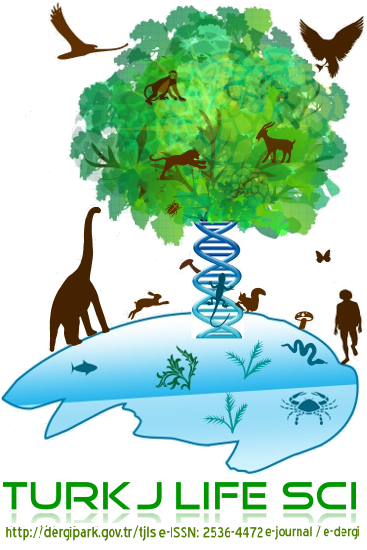Pyriproxyfen İnsektisitinin Allium cepa Somatik Kromozomları Üzerinde Mitotik Aktivite, Kromozom Anormallikleri ve Mikroçekirdek Sıklığıyla Genotoksik ve Sitotoksik Etkilerinin Değerlendirilmesi
Allium test, genotoksisite, kromozom, mikroçekirdek, pyriproxyfen, sitotoksisite
The Evaluation of the Genotoxic and Cytotoxic Effects of Pyriproxyfen Insecticide on Allium cepa Somatic Chromosomes with Mitotic Activity, Chromosome Abnormality and Micronucleus Frequency
Allium test, chromosome, cytotoxicity, genotoxicity, micronucleus, Pyriproxyfen,
___
- Badr A. 1983. Mitodepressive and chromotoxic activities of two herbicides in A. cepa. Cytologia, 48: 451-457.
- Coskun Y, Kilic S, Duran RE. 2015. The effects of the insecticide pyriproxyfen on germination, development and growth responses of maize seedlings. Fresenius Environmental Bulletin, 24: 278-284.
- EPA. 1999. U.S. Environmental Protection Agency, Policy on a common mechanism of action: the organophosphate pesticides. Fed. Register, 64, pp. 5795–5799.
- Fiskesjö G. 1985. The Allium test as a standard in environmental monitoring. Hereditas, 112: 99-112.
- Gebel T, Kevekordes S, Pav K, Edenharder R, Dunkelberg H. 1997. In vivo genotoxicity of selected herbicides in the mouse bone-marrow micronucleus test. Arch Toxicol, 71: 193-197.
- Grant WF. 1994. The present status of higher plant bioassays for the detection of environmental mutagens. Mutat Res, 310: 175-185.
- Ishaaya I, Horowitz AR. 1995. Pyriproxyfen, a novel insect growth regulator for controlling whiteflies: mechanisms and resistance management. Pesticide Science, 43: 227-232.
- Karaismailoglu MC, Inceer H, Hayırlıoglu-Ayaz S. 2013. Effects of quizalofop-p-ethyl herbicide on the somatic chromosomes of Helianthus annuus (Sunflower). Ekoloji, 22: 49-56.
- Karaismailoglu MC. 2013. Deltamethrin ve quizalofop-p-etil pestisitlerinin Helianthus annuus L. (Ayçiçeği) kök ucu hücreleri üzerine mutajenik etkilerinin araştırılması [MSc Thesis]. Trabzon: Karadeniz Technical University.
- Karaismailoglu MC. 2014a. Investigation of the cytotoxic and genotoxic effects of Artemisia annua methanol extract with the Allium test. Ekoloji, 23: 64-74.
- Karaismailoglu MC. 2014b. Evaluation of potential genotoxic effect of trifluralin in Helianthus annuus L. (Sunflower). Caryologia, 67: 216-221.
- Karaismailoglu MC. 2015. Investigation of the potential toxic effects of prometryne herbicide on Allium cepa root tip cells with mitotic activity, chromosome aberration, micronucleus frequency, nuclear DNA amount and comet assay. Caryologia, 68: 323-329.
- Khadra A, Pinelli E, Lacroix MZ, Bousquet-Melou A, Hamdi H, Merlina G, Guiresse M, Hafidi M. 2012. Assessment of the genotoxicity of quinolone and fluoroquinolones contaminated soil with the Vicia faba micronucleus test. Ecotoxicol Environ Safe, 76:187-192.
- Liman R, Cigerci IH, Akyıl D, Eren Y, Konuk M. 2011. Determination of genotoxicity of fenaminosulf by Allium and comet tests. Pesticide Biochem Physiol, 99: 61-64.
- [MARA] Ministry of Agricultural and Rural Affairs (Turkey). 2009. General directorate of protection and control; plant protection products. Ankara: Ministry of Agricultural and Rural Affairs of Republic of Turkey.
- Mercykutty VC, Stephen J. 1980. Adriamycin induced genetic toxicity as demonstrated by Allium cepa test. Cytologia, 45: 769-777.
- Panda BB, Sahu UK. 1985. Induction of abnormal spindle function and cytokinesis inhibition in mitotic cells of Allium cepa by the organophosphorus insecticide fensulfothion. Cytobios, 42: 147-155.
- Ping KY, Darah I, Yusuf UK, Yeng C, Sasidharan S. 2012. Genotoxicity of Euphorbia hirta: an Allium cepa assay. Molecules, 17: 7782-7791.
- Shehab AS, Adam ZM. 1983. Cytological effects of medicinal plants in Qatar III. Mitotic effect of water extract of Anastatica hierochuntico L. on Allium cepa. Cytologia, 48: 343-348.
- SPSS Inc. Released 2008. SPSS Statistics for Windows, Version 17.0. Chicago: SPSS Inc.
- Turkoglu S. 2009. Genotoxic effects of mono-, di-, and trisodium phosphate on mitotic activity DNA content, and nuclear volume in Allium cepa L. Caryologia, 62: 171-179.
- Başlangıç: 2016
- Yayıncı: Ömer Faruk ÇOLAK
Rejeneratif Tıpta Kullanılan Organ ve Doku Deselülerizasyon Yöntemleri
Çağrı BEKİRCAN, Yuri S. TOKAREV, Onur TOSUN, Hilal BAKİ
Türkiye’de Yetişen Compactae (Russula) Altcinsine Ait Türler
Ömer F. ÇOLAK, Mustafa IŞILOĞLU
Mustafa CÜCE, Tuba BEKİRCAN, Atalay SÖKMEN
Çukurova Üniversitesi (Adana) Kampüsündeki Bazı Tıbbi ve Aromatik Bitkiler
Nacide KIZILDAĞ, Cengiz DARICI, Agah Bahadır ÖZTÜRK
Türkiye Gypsophila L. (Caryophyllaceae) Cinsine Ait Hagenia A. Braun. Seksiyonunun Revizyonu
